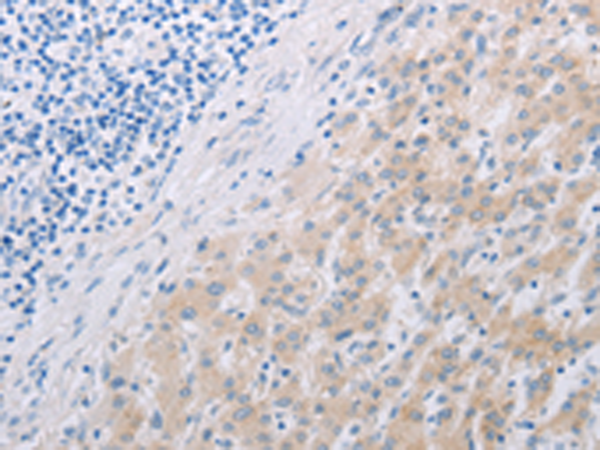


| WB | 咨询技术 | Human,Mouse,Rat |
| IF | 咨询技术 | Human,Mouse,Rat |
| IHC | 1/100-1/500 | Human,Mouse,Rat |
| ICC | 1/10-1/50 | Human,Mouse,Rat |
| FCM | 1/10-1/50 | Human,Mouse,Rat |
| Elisa | 咨询技术 | Human,Mouse,Rat |
| Aliases | PFL, D3S1319E |
| WB Predicted band size | 15 kDa |
| Host/Isotype | Rabbit IgG |
| Antibody Type | Primary antibody |
| Storage | Store at 4°C short term. Aliquot and store at -20°C long term. Avoid freeze/thaw cycles. |
| Species Reactivity | Human, Mouse, Rat |
| Immunogen | Synthetic peptide of human PFN2 |
| Formulation | Purified antibody in PBS with 0.05% sodium azide and 50% glycerol. |
+ +
以下是3篇与Parkin抗体相关的参考文献,涵盖其功能研究及抗体应用:
---
1. **文献名称**: *Familial Parkinson disease gene product, parkin, is a ubiquitin-protein ligase*
**作者**: Shimura, H. et al.
**摘要**: 该研究首次证实Parkin蛋白作为E3泛素连接酶的功能,发现帕金森病患者中PARK2基因突变导致异常蛋白聚集。通过Parkin抗体检测其在脑组织中的表达及与泛素化底物的相互作用,揭示了Parkin在蛋白降解通路中的关键作用。(*Nature Genetics*, 2000)
---
2. **文献名称**: *PINK1/Parkin-mediated mitophagy depends on VDAC1 and p62/SQSTM1*
**作者**: Geisler, S. et al.
**摘要**: 研究利用Parkin特异性抗体,通过免疫荧光和Western blot验证Parkin在PINK1介导的线粒体自噬中的定位与激活机制,阐明其与VDAC1、p62蛋白的协同作用,为帕金森病中线粒体质量调控提供证据。(*Nature Cell Biology*, 2010)
---
3. **文献名称**: *The mitochondrial deubiquitinase USP30 opposes parkin-mediated mitophagy*
**作者**: Bingol, B. et al.
**摘要**: 通过Parkin抗体检测泛素化修饰水平,揭示去泛素化酶USP30通过拮抗Parkin介导的线粒体泛素化抑制自噬,提出调控USP30可作为增强线粒体清除的治疗策略。(*Nature*, 2014)
---
4. **文献名称**: *Mitochondria and AMPK-dependent neuroprotection by Parkin*
**作者**: McWilliams, T.G. et al.
**摘要**: 研究使用Parkin抗体在小鼠模型中验证其神经保护功能,发现Parkin通过维持线粒体稳态和激活AMPK通路延缓神经元退变,为帕金森病机制提供新见解。(*Science Advances*, 2018)
---
以上文献均涉及Parkin抗体的实验应用(如Western blot、免疫组化),并聚焦于Parkin在泛素化、线粒体质量控制及神经退行性疾病中的功能。如需具体抗体品牌或实验细节,可进一步补充说明。
Parkin antibody is a crucial tool in studying the Parkin protein, encoded by the *PRKN* gene (formerly *PARK2*), which is linked to autosomal recessive early-onset Parkinson’s disease (PD). Parkin functions as an E3 ubiquitin ligase in the ubiquitin-proteasome system, tagging misfolded proteins for degradation. It also plays a central role in mitophagy, the selective clearance of damaged mitochondria, thereby maintaining mitochondrial quality and cellular homeostasis. Mutations in *PRKN* disrupt these processes, leading to neuronal degeneration, a hallmark of PD.
Parkin antibodies are widely used in research to detect Parkin expression, localization, and post-translational modifications via techniques like Western blotting, immunohistochemistry, and immunofluorescence. These studies help elucidate Parkin’s regulatory mechanisms, including its activation by PTEN-induced kinase 1 (PINK1) during mitochondrial stress. Additionally, Parkin antibodies aid in exploring its interactions with proteins involved in ubiquitination, autophagy, and mitochondrial dynamics.
Researchers also employ Parkin antibodies to investigate disease models, such as patient-derived cells or animal models with *PRKN* mutations, to assess Parkin dysfunction in PD pathogenesis. Specificity and validation of these antibodies are critical, as splice variants and homologous proteins may cross-react. Understanding Parkin’s role through antibody-based assays continues to advance therapeutic strategies targeting mitochondrial health and protein aggregation in neurodegenerative diseases.
×